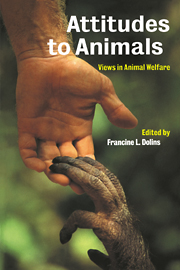Book contents
- Frontmatter
- Contents
- List of contributors
- Acknowledgements
- Part I Attitudes to animals
- Part II Animal awareness
- 4 The problem of animal subjectivity and its consequences for the scientific measurement of animal suffering
- 5 Environmental enrichment and impoverishment: neurophysiological effects
- 6 The behavioural requirements of farm animals for psychological well-being and survival
- 7 Personality and the happiness of the chimpanzee
- 8 Primate cognition: evidence for the ethical treatment of primates
- Part III Animal welfare
- Part IV Research and education
- Part V Epilogue: the future of wild animals
- Index
6 - The behavioural requirements of farm animals for psychological well-being and survival
Published online by Cambridge University Press: 16 November 2009
- Frontmatter
- Contents
- List of contributors
- Acknowledgements
- Part I Attitudes to animals
- Part II Animal awareness
- 4 The problem of animal subjectivity and its consequences for the scientific measurement of animal suffering
- 5 Environmental enrichment and impoverishment: neurophysiological effects
- 6 The behavioural requirements of farm animals for psychological well-being and survival
- 7 Personality and the happiness of the chimpanzee
- 8 Primate cognition: evidence for the ethical treatment of primates
- Part III Animal welfare
- Part IV Research and education
- Part V Epilogue: the future of wild animals
- Index
Summary
Introduction
It was once thought that all a captive animal required was food, water and a mate. Scientists researching into the welfare of animals realize that their needs extend far beyond food, water and a mate (e.g. Hughes & Duncan, 1988; Dawkins, 1990; Poole, 1992). However, under current United Kingdom legislation, many farm animals are often deprived to varying degrees of these basic resources. This may not only affect animals' psychological well-being, but also their perception of their chances of survival.
This chapter will address the following issues that concern the abundance of areas in which the welfare of animals might be adversely affected:
(a) Are there behavioural needs?
(b)Are the effects of depriving some behavioural patterns worse than others?
(c) How do we go about countering the effects of depriving animals the opportunities to perform their full behavioural repertoire?
The rest of this chapter will address these questions.
The behavioural repertoires of animals have evolved to maximize the individual's fitness, which may be equated to the number of copies of its genes in the population (Krebs & Davies, 1993). An individual behavioural pattern may be divided into two distinct phases: appetitive and consummatory. For example, foraging behaviour consists of looking for food (appetitive behaviour) and eating the found food (consummatory behaviour). Since the consumption of food helps to restore physiological homeostasis with the animal's body, it is not surprising that such (consummatory) behaviour is positively reinforcing. However, some scientists interested in the welfare of animals have suggested that the appetitive phase (i.e. the looking for food) is also reinforcing (Herrnstein, 1977; Hughes & Duncan, 1988).
- Type
- Chapter
- Information
- Attitudes to AnimalsViews in Animal Welfare, pp. 77 - 100Publisher: Cambridge University PressPrint publication year: 1999
- 7
- Cited by



